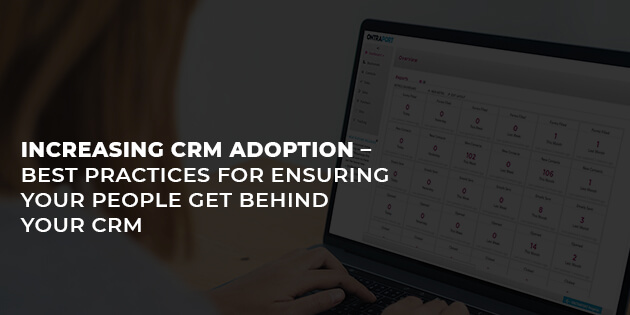Not all CRM solutions work for all businesses. Here’s how to find the ideal one for your team and make sure they understand how and why they should use it.
No matter how challenging implementing a CRM strategy into your business can be, know that it’s an important task. That’s why you should ensure the new platform integrates with it effectively.
To start with, your team should learn how to use this system and get comfortable with it. You can expect that they may have certain doubts about it, especially in the beginning. And there may be many reasons behind such feelings.
For instance, your employees may find it hard to adjust to a major change. This usually happens if they were okay with the system you used before. It was easy and familiar for them, and they may have been doing their job very well. The new strategy may make them feel insecure and wonder if they’ll be able to perform just as well.
Also, adapting to a new system takes time, and not all your employees are equally tech-savvy. Some of them may even find the platform difficult to use.
Another common reason is that your team may view the new CRM software as a monitoring tool. Some platforms can track your activity and performance, so your employees may think you’ll be monitoring them all the time. They may feel uncomfortable if they’re unable to meet a monthly goal, for example.
Luckily, there are ways to encourage the wide-scale adoption of CRM platforms. In this article, we’ll talk about the most successful ones.

The 10 Best Practices for Successful CRM Implementation
#1 Train Your Team Well
Some business owners expect their employees to simply embrace changes and learn how to use new software entirely by themselves.
But the truth is, your team will need help and proper training if you want to implement the CRM successfully. The key is to pick the right kind of training for your people and make sure they receive feedback on their progress.
And how do you know which training is the right one?
It must involve hands-on work. It’s much easier to learn how to use a program by testing it than by reading instructions.
Have employees work with each other by organising group training. This has the added benefit of boosting team spirit, too. Also, present your team with different scenarios that need solutions. It’s how your team can practice problem-solving techniques and play different roles.
A follow-up training is also a good idea if you want to ensure the team is making the best out of the new platform. You’ll be giving your employees opportunities to broaden their knowledge. And if you keep the training available at all times, it shows how much you’re dedicated to the program.
#2 Involve Your People in the Planning
You’re building a team of people who share your visions. Thus, you’ll want to include them in the planning processes. You’ll find it easier to gain their support and they’ll feel appreciated as contributors to the business.
Involving your people from the beginning makes them more open to change. So, tell them you’re looking to put in place a new CRM system and ask for their opinion. You can do it via surveys or collect individual feedback from everyone.
Also, a suitable CRM doesn’t only benefit your customers. It also solves issues for your executives and other people who make decisions within the business, so you should talk to them about your plans. Ask them about their problems and what they think would solve them.
#3 Confront Some of the Key Concerns Your Team May Have
If you notice your team members have issues with specific elements of the CRM tool, address them as soon as possible. They need to feel heard, which is the first step to solving the problem. After all, the whole success of the implementation also depends on how they adopt the software. Their feedback matters.
Before you schedule a meeting with your team, think of what may be troubling them. Ask them during the meeting if there are specific parts of the software they may be having trouble with. Identify possible concerns about meeting goals and adapting fast to the change.
Assure your employees they’ll receive all the necessary training for using the new platform. Also, encourage your team to turn to you or other colleagues if they’re having an issue with the CRM.
#4 Have a CRM Project Manager Who Acts as a Conduit Between You and Your Team
A CRM project manager can help you speed up the whole implementation process.
Their role will be like the one your CRM champion has, which you’ll read about in the next section. But the difference is in the fact that you don’t need to train your project manager.
They already dominate the program and can be in charge of the transition. Make sure your CRM project manager has good communication and teaching skills and is proficient in the necessary IT areas.
A CRM project manager’s primary responsibility will include platform management, too. Even after you’ve started using it, the post-implementation period is also important. This person will measure the results and give suggestions on how you can improve in the future.
At some point, the implementation process will end. It’s useful to have a go-to person until the entire team is fully capable of working with the new tool on their own.
#5 Create CRM Champions
You don’t need to train the whole team immediately upon implementation of a new CRM. For starters, you can choose your top performers or executives who will be able to pass the knowledge to their respective teams.
Every team should have one contact person who will know everything about the new tool. They should be available for any consultation or support during the adoption process. So, make sure it’s a person who knows your business very well and has an excellent understanding of the CRM tool.
Consider providing as much in-depth training for your CRM champion as possible. Remember, one of their tasks will be to train others so they need to know as much as they can about it.
If you need help implementing this more detailed training, Automation Agency can help. We can optimise it and tailor it to your needs. Send us a task to learn more about our strategy.
#6 Personalise and Simplify the CRM
Remember, you don’t need to stick to the conventional ways of using your CRM tool. Customisable elements allow you to make it more convenient and unique, just like your business.
Many CRM tools available on the market enable you to personalise it and add your options. These easily allow you to make it more suitable for your team.
If you provide them with an appealing and interesting new software that “looks” like your business, it might be easier for them to get used to working in it. And if they stumble upon familiar workflows, fields, or task names, your employees will be more likely to adopt the new software as soon as possible.
#7 Create Required Workflow Steps for Your Team
Consistency is one of the critical elements of any successful business. That’s why you should ensure your workflows stay in place even after you install the new CRM tool.
The thing is, it’s not enough just to train people and start using the software.
Enumerating the necessary steps your team can follow during the transition can be useful. More importantly, it’ll make things easier for them. If you enforce a specific set of steps an employee must complete to finish a task, they’ll likely adopt the new process faster.
Not only will you make sure they won’t skip any important steps, but you’ll also make it easier for them to stick to a routine.
#8 Use the Platform in Meetings
If you want your employees to adopt something, you need to set an example first. Why not use the new platform in your meetings? If you’re talking about your customer relationship management, use the platform to give your team examples.
Doing so makes it easier for your staff to understand what you’re talking about. Moreover, if they see you being comfortable with using the platform, they’ll be more likely to follow in your footsteps.
The best thing about it is that you can use your CRM for meetings with different departments, not just in Customer Service. It’ll be a great addition to your Marketing or Sales meetings, too.
Note that meetings can also be a good place for you to share any successes you’ve had with the platform. If a team has exceeded their goals with the help of the platform, make sure you mention it. It’ll be a great motivation for them, and everyone else.
#9 Make the CRM Mobile-Friendly
Your employees may typically work on their computers but certain job requirements may demand some fieldwork. If anyone on your team has to use their mobile phone to enter data in your newest CRM tool, you should consider introducing a mobile-friendly one.
There are several benefits you can experience with this. Your employees may adopt the new CRM program faster and it can make the work more efficient. It also gives you a chance to introduce remote work, if you haven’t already.
You can even connect some mobile-friendly CRM tools to your business’ social media platforms. It can enhance your sales and marketing funnels and improve your social listening.
#10 Choose a Scalable Platform
Suppose your business is going to grow in the future, which may be one of your primary goals. Your customer database may grow as well, so your CRM platform should follow.
Instead of finding new systems every few years and training your team all over again, make sure you choose a scalable product.
If it’s flexible enough, it’ll be able to follow your business’ growth and adapt to any changes. Thus, your employees won’t need to learn how to use new programs too often. They’ll just have the opportunity to enhance their knowledge about the platform you’re already using.
Don’t Forget to Make it Fun
Learning new things is about education, but it should also be a fun experience. Your employees should enjoy enhancing their skillset.
It’s true that you may stumble upon a few obstacles while implementing a new CRM tool into your business processes. Still, it can bring many benefits to your customer relationship management. It’s your job to make these benefits obvious to your employees. You need to provide the necessary education on how to use the new software following your workflow.
Addressing issues on time is crucial. If you want this transition to happen as smoothly as possible, contact Automation Agency for support. Our team can help you integrate a variety of CRM platforms into your business. We’ll also help you choose the right training and find a suitable project manager to handle the implementation.
We can show you how to personalise your new CRM tool and make it as easy as possible for your team to use it. Check out our Concierge Service to learn more about specific tasks we can assist with.


